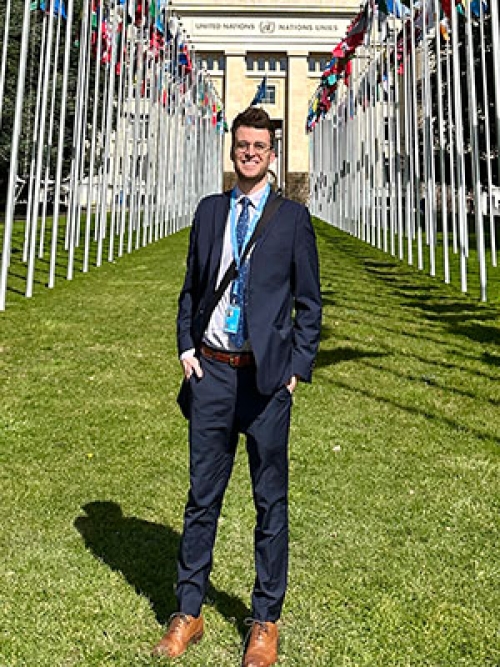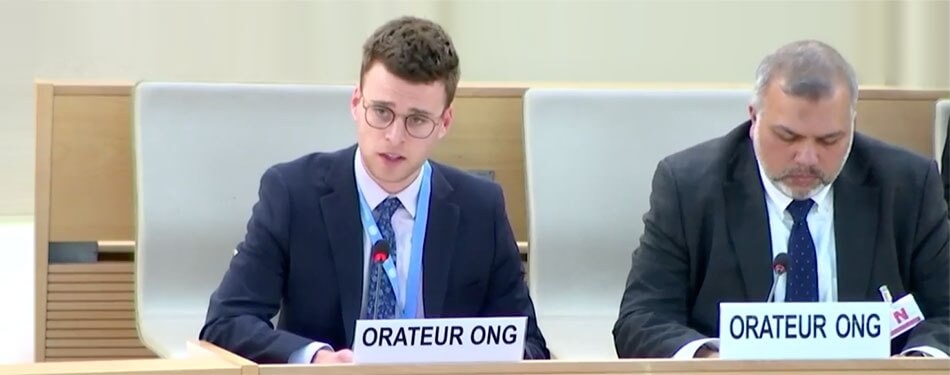A mere two months into his externship in Geneva, 2L Collin Christner found himself on the world stage as he made a statement at the March 6 meeting of the UN Human Rights Council (UNHRC). It was a big moment for Christner about an important topic: the human rights of Rohingya Muslims and other minorities in Myanmar.

Speaking on behalf of the International Commission of Jurists (ICJ), the NGO where he is doing his semester-long externship, Christner told the assembled members of the council as well as several others that Myanmar’s ruling junta “has demonstrated in countless ways that it will continue to use the legal system as a weapon to harass, suppress, and persecute minorities.”
In the weeks since that statement, Christner has returned to the UNHRC to speak again for the ICJ regarding human rights violations in Colombia, Egypt, Guatemala, Israel and Palestine, South Africa, Tunisia, and Venezuela. The ICJ is a global network of judges, lawyers, and human rights defenders who work on behalf of victims of human rights abuses to hold those responsible accountable.
“One big part of the work the ICJ does is presentations at the Human Rights Council,” said Christner. “And they often involve the Michigan Law externs in those presentations.”
His frequent appearances in the international forum are just part of his externship position. His main focus is on the Central Asian republics of the former Soviet Union.
“A lot of what I do is more related to research and advocacy,” he said. “Something that I’m working on, and maybe a better example of what the ICJ does on a day-to-day basis, is a report about best practices for implementation of human rights body decisions in Uzbekistan.”
That country, he said, is one of more than 170 parties to the International Covenant on Civil and Political Rights (ICCPR), a human rights treaty. Citizens of Uzbekistan who feel the country has violated their civil rights can file complaints with the Human Rights Committee—a concept that is unusual in the context of American law.
“In the US, we don’t have any recourse to the international courts,” he said. “If our rights are violated, we have the Supreme Court. That’s it.”
When an individual in Uzbekistan does file a complaint and the UN affirms that the person’s rights have been violated, the process of reconciling the international and Uzbek laws begins, and is oftentimes complicated.
“The question for a lot of countries is, how do you not subordinate yourself to international law and give up all your sovereignty?” said Christner. “So my report is about how, in realistic terms, judges and lawyers in Uzbekistan can go about giving legal effect to these decisions.”
While he eventually wants to practice civil rights law in the US, he said his international work provides a broader view of how the world thinks about these issues. And while the world is rife with civil rights abuses, he is encouraged that many countries are willing to sign onto treaties even though their track record in this area is bad.
“We meet as an internship group every week, and one of the big debates we’ve been having is, how much does this actually work? And some people do land on the more negative side. When China and Egypt and Iran and Syria are allowed to say whatever they want when they are on the council, when they all try and do their best to stall some of the better resolutions that are coming out.
“On the other hand, what’s the other option? Not talk about these things? I still think there’s value to that, and I think those countries clearly see value in the forum. They’re here, and they’re listening, and they’re responding. And even if we have a long way to go, I find that encouraging.”







